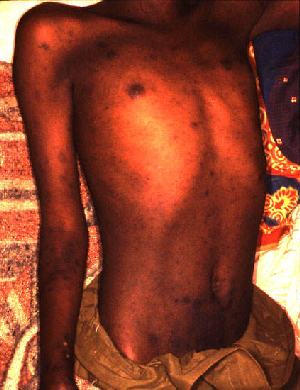Epidemic
(Redirected from Health disaster)
An epidemic is a widespread occurrence of an infectious disease in a community or population within a specific geographic area and timeframe. It is characterized by a rapid increase in the number of cases of a particular disease, exceeding what is typically expected for the population in that area.
Understanding Epidemics[edit | edit source]
Distinguishing Factors[edit | edit source]
- An epidemic should not be confused with an endemic, pandemic, or outbreak. The distinctions are:
- Endemic: A disease or condition regularly found among particular people or in a certain area.
- Epidemic: A sudden increase in the number of cases of a disease above what is normally expected in that population in that area.
- Pandemic: An epidemic that has spread over multiple countries or continents, affecting a large number of people.
- Outbreak: Similar to an epidemic but typically refers to a more limited geographic area.
Factors Contributing to Epidemics[edit | edit source]
- Various factors can contribute to the occurrence of an epidemic:
- Agent Factors: Characteristics of the pathogen such as virulence, infectivity, and mode of transmission.
- Host Factors: Susceptibility of the population to the disease, immunity levels, and general health.
- Environmental Factors: Physical, social, and economic environments that can facilitate the spread of the disease.
Management and Control[edit | edit source]
Effective management and control of an epidemic require coordinated efforts to understand the nature of the disease and implement interventions.
Surveillance[edit | edit source]
- Identification: Early identification of an increase in cases is crucial.
- Monitoring: Regular monitoring of disease trends and characteristics.
- Reporting: Prompt reporting to public health authorities.
Interventions[edit | edit source]
- Quarantine and Isolation: Isolating the infected individuals and quarantining those who were exposed.
- Vaccination Campaigns: When vaccines are available, conducting mass vaccination campaigns.
- Treatment: Providing medical care to the affected individuals.
- Public Education: Educating the public on how to prevent the spread of the disease.
- Travel Restrictions: Implementing travel restrictions to and from affected areas to limit the spread.
Evaluation[edit | edit source]
- Assessment: Regular assessment of the effectiveness of interventions.
- Feedback: Providing feedback to relevant stakeholders to improve strategies.
Historical Examples[edit | edit source]
- Epidemics have occurred throughout history, and some examples include:
- The Spanish flu (1918-1919): An H1N1 influenza pandemic that is one of the deadliest in history.
- The cholera epidemics of the 19th and 20th centuries.
- The Ebola epidemic in West Africa (2014-2016).
Conclusion[edit | edit source]
Understanding and controlling epidemics is critical for global health. Through coordinated efforts including surveillance, intervention, and evaluation, epidemics can be managed to minimize their impact on populations.
See Also[edit | edit source]
References[edit | edit source]
Transform your life with W8MD's budget GLP1 injections from $125
W8MD offers a medical weight loss program NYC and a clinic to lose weight in Philadelphia. Our W8MD's physician supervised medical weight loss centers in NYC provides expert medical guidance, and offers telemedicine options for convenience.
Why choose W8MD?
- Comprehensive care with FDA-approved weight loss medications including:
- loss injections in NYC both generic and brand names:
- weight loss medications including Phentermine, Qsymia, Diethylpropion etc.
- Accept most insurances for visits or discounted self pay cost.
- Generic weight loss injections starting from just $125.00 for the starting dose
- In person weight loss NYC and telemedicine medical weight loss options in New York city available
- Budget GLP1 weight loss injections in NYC starting from $125.00 biweekly with insurance!
Book Your Appointment
Start your NYC weight loss journey today at our NYC medical weight loss, and Philadelphia medical weight loss Call (718)946-5500 for NY and 215 676 2334 for PA
Search WikiMD
Ad.Tired of being Overweight? Try W8MD's NYC physician weight loss.
Semaglutide (Ozempic / Wegovy and Tirzepatide (Mounjaro / Zepbound) available. Call 718 946 5500.
Advertise on WikiMD
|
WikiMD's Wellness Encyclopedia |
| Let Food Be Thy Medicine Medicine Thy Food - Hippocrates |
Translate this page: - East Asian
中文,
日本,
한국어,
South Asian
हिन्दी,
தமிழ்,
తెలుగు,
Urdu,
ಕನ್ನಡ,
Southeast Asian
Indonesian,
Vietnamese,
Thai,
မြန်မာဘာသာ,
বাংলা
European
español,
Deutsch,
français,
Greek,
português do Brasil,
polski,
română,
русский,
Nederlands,
norsk,
svenska,
suomi,
Italian
Middle Eastern & African
عربى,
Turkish,
Persian,
Hebrew,
Afrikaans,
isiZulu,
Kiswahili,
Other
Bulgarian,
Hungarian,
Czech,
Swedish,
മലയാളം,
मराठी,
ਪੰਜਾਬੀ,
ગુજરાતી,
Portuguese,
Ukrainian
Medical Disclaimer: WikiMD is not a substitute for professional medical advice. The information on WikiMD is provided as an information resource only, may be incorrect, outdated or misleading, and is not to be used or relied on for any diagnostic or treatment purposes. Please consult your health care provider before making any healthcare decisions or for guidance about a specific medical condition. WikiMD expressly disclaims responsibility, and shall have no liability, for any damages, loss, injury, or liability whatsoever suffered as a result of your reliance on the information contained in this site. By visiting this site you agree to the foregoing terms and conditions, which may from time to time be changed or supplemented by WikiMD. If you do not agree to the foregoing terms and conditions, you should not enter or use this site. See full disclaimer.
Credits:Most images are courtesy of Wikimedia commons, and templates, categories Wikipedia, licensed under CC BY SA or similar.
Contributors: Prab R. Tumpati, MD



